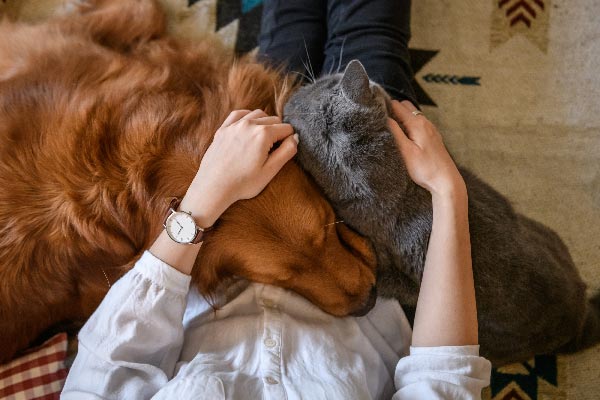After a news article about a dog found positive for Coronavirus in Hong Kong, the WHO has expressed its opinion on the link between viruses and animals, trying to reassure many pet owners who have worried about the health of their four-legged friend and people.
So, let’s shed some light on the most important issues with a series of questions and answers.

Can the virus infect pets and vice versa?
The WHO states that at the moment there is no clear evidence that animals can be infected with the Covid-19 virus and therefore are not able to spread the epidemic. It should be remembered, however, that the virus can be transmitted to humans indirectly; Therefore, when touching an animal, keep to essential sanitary and hygienic rules: protect your nose and mouth, wear gloves if possible, wash your hands with soap and water for at least 30 seconds.
What should I do if the animal has come into contact with a person suffering from coronavirus?
By adopting the precautionary principles, if an animal has come into contact with someone suffering from Covid-19, it is better to avoid putting it in contact with other people, especially if in at-risk groups, complying with the appropriate hygiene and sanitary regulations. For humans: wash hands or use an alcohol-based disinfectant. For the animal: disinfect hair and paws and avoid close contact with body fluids.
Can I take the dog out?
The Prime Ministerial Decree adopted by the Government stipulates that you can leave your home for necessary reasons. These include the performance of the pet´s physiological functions, such as exercise and physiological needs. But the walk must be short and within the area of its municipality, on foot and respecting the rules of social distancing and use of the sanitary devices required in the same Decree.
Should the animal’s paws be disinfected?
In general, always disinfect the pet´s paws after each walk, run or activity outside the dwelling. This is a good habit to adopt before and after the Coronavirus outbreak. This is because the animal, exposed without protection to the soil, can be a receptacle of bacteria, viruses and dirt from the soil. After each walk, disinfect the animal´s paws using the necessary hygienic and sanitary precautions for humans.
Cuddles, kisses, scratches. How to deal with pets
As mentioned above, although there is no reliable data on direct contagion between animal and man, this does not exclude indirect contagion, that is, through the collection of contaminated particles on the paws or hair. It is therefore recommended to disinfect the animal´s paws and hair each time after going out, and avoid direct contact with your dog´s body fluids, at least as a precaution. Therefore, avoid licking, especially on the face, kisses and the direct exchange of food from the same implement.
What to do if the owner is quarantined
The new text of the self-certification reiterates that the person assumes full responsibility for not being tested positive for coronavirus or for not being in preventive quarantine. Therefore, persons whose characteristics are in line with these two categories may not leave their home. A quarantined master possibly suffering from coronavirus will not be able to leave the house to carry out the physiological needs of the animal.
If you are the only one to take care of the animal, take all the necessary hygienic and sanitary precautions using sanitary devices, avoiding too close contact with the animal such as kisses, cuddles and scratches and resort to emergency solutions for the animal´s physiological needs. For all other situations, it is better to entrust the care of the animal to a healthy family member, a friend or relative who will still have to take care of the animal respecting the sanitary and hygienic rules provided: use the mask and gloves, disinfect the animal’s coat and paws after going out, avoid close contact with body fluids.
What are the rules for municipal gardens and dog areas?
The rules for these areas are the same for the urban crowding areas listed in the Ministerial Decree: have self-certification; access is allowed by limiting necessary exercise requirements or normal physiological functions; do not let the dog run free without a leash; respect the rules for both animals and humans; take sanitary and hygienic measures using disposable masks and gloves. Municipalities are taking specific quota entry measures in dog areas or municipal gardens where these rules cannot be respected.
Can volunteers continue to carry out their work?
Authorised volunteers who work in a kennel or cattery can carry out their activities by duly signing the self-certification.
On the other hand, adopting and being entrusted with animals are suspended unless there are demanding requirements.
